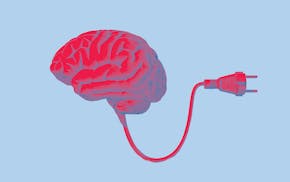In late 2016, I published a list of my "top 10 incongruous thoughts" for the coming year. I'd intended for it to become an annual thing, so that I, too, could contribute to the typical year-end glut of such material. But the muse is fickle.
Now it's March. On the other hand, I'm a Pisces and my astrological year is just beginning. So, herein, my top 10 random but loosely connected thoughts for 2018, with sporadic bursts of gravitas at no extra cost to subscribers. (Nonsubscribers, this will count against your monthly views at StarTribune.com, which, I don't know, maybe you'll regret?)
1. We're awash in epidemics, both literal ones like opioid addiction and problems of an epidemic nature, like gun violence. But the overarching epidemic of our times is reductionism — confidently reaching simple conclusions on complex matters. Next time you listen to a politician or pundit, or just to your average individual assessing matters from a bar stool, sofa or Aeron desk chair, ask yourself if they aren't oversimplifying — drawing bright lines where they don't belong. You can even ask this of me, since I've just purported to have diagnosed society's chief sickness in 70-odd words.
2. I'm not the first to note this, but there's a way in which President Donald Trump is consistently successful. He spells it out in his ghostwritten book "The Art of the Deal": When you start negotiating from a ridiculous position, you'll move the center line, and you'll finish more favorably than you might have on the strength of your situation alone. Trump has done this time and again in our current political epoch. The strategy relies on exploiting others' reluctance to be intractable. It's his one true talent, and it serves him better than any of us should wish it to.
3. Except when I'm on vacation, I read nearly all the letters to the editor that arrive at the Star Tribune, from all kinds of people. Most writers are earnest. Some of them are gadflies. I'd distinguish the latter type from other prolific contributors who are consistently thoughtful. You know who you are. Or maybe you don't. In any case, I've concluded that we need the provocative gadflies. We need people speaking out from the fringe. It's where action begins. But — crucially — it's up to the rest of us to refine it.
Even if you're not a gadfly, maybe you have something you'd like to say to our community of readers. Think it through as best you can, then send it along. We get a lot of submissions, so maybe it won't be published. Probably it won't. Maybe someone will write it better. Maybe the topic isn't quite ripe but will be later. In any case, you'll have planted a seed. As I select letters for publication, I try my best to recognize themes that develop over time. Even a letter that isn't published can make a difference.
Instructions on how to submit a letter or commentary, along with the length guidelines that should be met, are published on our editorial page every day. Some people don't know that. There's also a constant link online, near the top of our section front at startribune.com/opinion, plus an online guide detailing who those of us producing the opinion pages are and how we do our work. Check it out. Or e-mail us at opinion@startribune.com. Just don't be cryptic. Be clear about who you are, where you are, what you're referring to and how we can reach you if necessary.
4. We recently published a few letters about violence in the movies. It's a recurring topic, usually expressed as a gratuitous ill. But, as a subsequent writer pointed out, people seem to enjoy violent movies — worldwide.
Along with the first set of letters, we included a photo illustration under which I referred to Aristotle's theory of catharsis in dramatic art. It's not a topic in which I'm fully versed, but one in which I'm interested and that seems relevant. I was going fishing with that caption, hoping readers would take up the exploration. What is it we get vicariously from violent expression? Does it help purge the violent instincts that are, on some level, within us all? If so, is there a limit to this benefit? What about when the medium is interactive, such as in first-person-shooter video games? Are today's realistic game portrayals more problematic than the electronic blobs I was shooting at on my Atari in 1983? Or the football games in which we were to hit hard, with fire in our blood? If so, in the full analysis, why?
5. Another argument we receive with some regularity, and have sometimes published, is that electronic devices are laying waste to our time — and our minds, especially when it comes to our kids.
I don't fully agree. I spend a lot of time on my iPad. I can read books. View lectures. (Attempt to) learn languages. Keep up with my work. Manage my finances. Call my mom on FaceTime. And many other constructive activities.
There are, of course, other things I do just for a frivolous escape, and I suppose one could get carried away with that, but most of my use is edifying. As with any product (gun owners will like this line), it's in the "how." It's an awesome power we hold in our hands.
6. And behind the wheel is not the place to wield that power. We recently ran an editorial encouraging legislators to make Minnesota the 17th state to ban use of handheld cellphones and other electronic devices while driving. The legislation, as proposed, would continue to allow calls through a speaker or earbud.
That's still too permissive. I don't think any of us can talk to someone not in our presence without having our attention drift into our mind's eye, away from the road. I have equal doubts about the interactive panels that manufacturers are putting on dashboards.
Wherever the law settles, you have a choice. When you're driving, you can choose to do nothing but drive. But if your goal instead is to be a menace to other people, pick up your phone, reprogram your soundtrack or revise course on your navigation app, and voilà!
7. People spell "voilà" in funny ways. Just in the last few weeks I've seen it presented as "walla" and "wah la." I suppose that's not any stranger than the idea that "voi" should be pronounced "vwah." The acronym for Voice over Internet Protocol is VoIP. And how is that sounded out?
8. More than a third of the words in common English usage have some sort of French connection. We seem OK with the French people currently, though it was dicey for a while. In fact, we use words from almost every country we've considered undesirable at some point in our history. If our language can draw fruitfully from such diverse sources, so can we.
9. OK, getting back to my Pisces reference from near the top, I actually do read my horoscope. Not as a literal prognostication, just as a jumping-off point for introspection. If the predicted circumstances were to occur, how might they realistically manifest in my life, in large ways or (more likely) small, and how might I feel about it, and how might I best respond? It's sometimes a stretch, but the less-goofy horoscopes offer decent generalizations of the human condition. It never hurts to get ahead of the curve, from wherever you can find inspiration.
• • •
So, that's my list. You'll notice that there are fewer than the promised 10 items. What I can I say? I crave a certain structure, but I despise rigidity. Look for the next installment near the end of 2018, or at some unspecified time thereafter.
David Banks is at David.Banks@startribune.com.

Rash: Tariffs and reckless rhetoric repel international tourists from U.S. travel
Counterpoint: Sale of Allete/Minnesota Power is in the public interest
Readers Write: Ukraine "peace plan," trans rights

